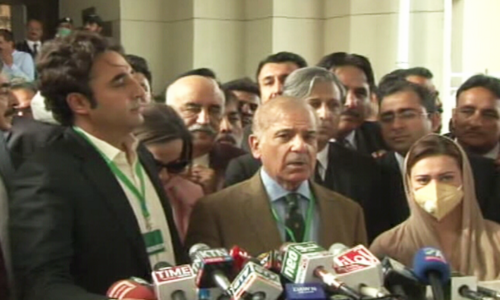ISLAMABAD: The National Assembly speaker’s decision to convene the session of the lower house of parliament beyond the stipulated time frame has generated debate on the scope of Article 254 of the Constitution, and whether it justifies the postponement of a crucial sitting requisitioned under Article 95 to vote on a resolution of no-confidence against the prime minister.
While constitutional experts belonging to the opposition parties insist that the speaker’s decision to delay the National Assembly’s session is tantamount to high treason, those known for their independent views have termed this a ‘marriage of convenience’.
Read: Opposition berates NA speaker for ‘violating’ Constitution
According to Senator Raza Rabbani, who headed the constitutional reforms committee which authored the 18th Constitution Amendment, “Article 254 of the 1973 Constitution is a general provision, whereas Article 95 is a specific provision relating to a requisition of a sitting of parliament within the specified period of 14 days.”
Legal opinion on whether this general provision applies to the summoning of an NA sitting for no-trust is also divided along party lines
He said that it was a settled law that a specific provision would prevail over a general provision and failure by the speaker to summon the house within 14 days was a clear violation of the Constitution.
According to him, recourse to Article 254 does not condone the act of violating the constitutional provision, but only provides cover for an act that is performed after the prescribed time has expired.
Earlier, the PM’s adviser on parliamentary affairs, Dr Babar Awan, had defended the speaker’s decision to summon the session on March 25, saying that it was in line with the Constitution.
He had referred to Article 254 of the Constitution, which states that “when anything is required to be done within a particular period but is not, the carrying out of that act or thing does not become invalid or ineffective just because it was not done within the prescribed period”.
But in Mr Rabbani’s view, the requisition of a session of the National Assembly under Article 54, read with Article 95 (which deals with the vote of no-confidence), places the onus on the speaker to ensure that he summons the house before the expiry of 14 days — the outer limit provided by the Constitution.
In his words, by not summoning the house within the period stipulated, the speaker is not only violating the Constitution but has also breached the privilege of parliament and its members.
Senator Rabbani was of the opinion that the speaker had, in a way, abdicated the powers conferred on him under Article 54 to the political party he belongs to.

‘Subverting’ the Constitution
Taking a more rigid stance, former law minister and PPP senator Farooq H. Naek termed the speaker’s act “a subversion of the Constitution”.
Talking to Dawn, he said that the National Assembly speaker had relied upon the wrong legal provision to justify a delay in summoning the session of the lower house.
He was of the view that Article 254 was part of previous constitutions as well and was incorporated in the 1973 Constitution to give “post-facto condonation” in extreme cases.
According to Mr Naek, such provisions were also part of the constitutions of other countries, and in Pakistan, it was included in the constitutions of 1956 and 1962, and subsequently carried forward into the document framed in 1973.
However, in this case, the mala fide intention of the NA speaker “is obvious”, since the session was requisitioned on March 8, while the speaker was aware that the OIC meeting was scheduled for 22nd and 23rd. Mr Naek said the speaker could have summoned the session sometime in the second week of March, but waited until the last day and on the pretext of the OIC moot, he dragged his heels on convening the sitting.
A question of justification
But senior lawyer Mohammad Azhar Siddique, who is close to the ruling Pakistan Tehreek-i-Insaf, said that Article 254 was self-explanatory, as its very title read: “Failure to comply with requirement as to time does not render an act invalid.”
Mr Siddique said that the Constitution never suggested any punitive action for a delay that was not deliberate, but provided a remedy to condone such an action.
However, former PTI leader and leading lawyer Hamid Khan said that the real question was whether a planned constitutional move can be pre-empted by using another constitutional provision?
The answer is obviously “no”, he said.
In his words, the justification of non-availability of the assembly hall may not be a tangible justification since the OIC meeting was planned in advance. He said the speaker could have taken a better position, for example, contending that the result of a no-confidence resolution might create a chaotic situation, which was why voting had to be postponed.
Mr Khan, however, said that such a delay could not be termed “subversion of the Constitution”, which is an offence under Article 6, i.e. treason.
Published in Dawn, March 24th, 2022














































